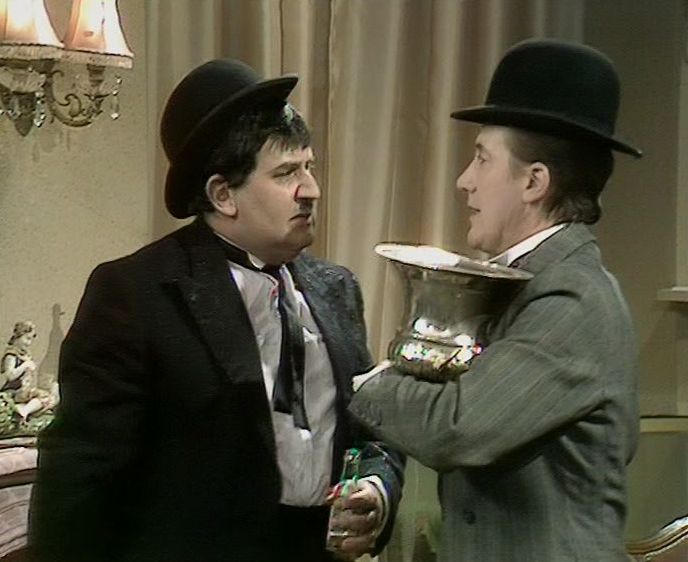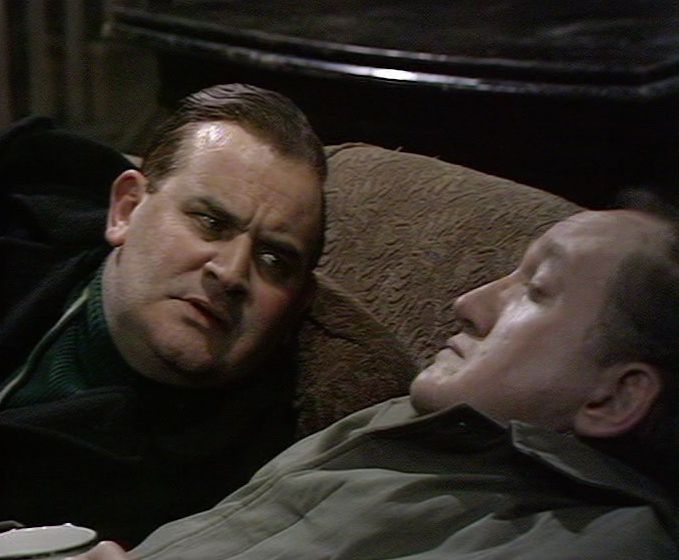“With these feet?”
The series proper of Porridge kicks off with this episode. As touched upon in the last post, a few adjustments have had to be made – at the end of Prisoner and Escort it looks like Fletch had already been processed and allocated a cell (he’d certainly been in for a chat with the governor).
At the start of New Faces, Old Hands the story has rewound somewhat – Fletcher now finds himself lined up with the ingenuous Godber (Richard Beckinsale) and the gormless Heslop (Brian Glover) as the three are forced to listen to a lecture from Mackay, suffer a cursory inspection from the indifferent Medical Officer (John Bennett) and then are dished out with uniforms from Mr Barrowclough (“looks like Charlie Chaplin on stilts”).
Godber is the audience identification figure. Fletch instructs him (and us) about the way the prison works. Fletcher, the old hand of the title, knows the system inside out and how far it can pushed. Godber’s accent is a little more noticeable in this episode (possibly it was suggested to Beckinsale that he tone it down).
Brian Glover (“I read a book once. Green it was”) makes the first of three appearances as Heslop. He’d already had form with Clement and La Frenais – turning up as the cackling Flint in the series one Whatever Happened To The Likely Lads? episode No Hiding Place (tx 20th February 1973).
Michael Barrington debuts as the governor, Mr Venables (he’d appear eight times in total). Clearly Barrington had that sort of face, as he’d already played a prison governor in the forgotten late 1960’s sitcom Her Majesty’s Pleasure (which also featured a future Slade prison inhabitant – Ken Jones).
New Faces, Old Hands is stuffed with quotable lines. For example –
MO: Suffer from any illness?
Fletch: Bad feet.
MO: Suffer from any illness?
Fletch: Bad feet!
MO: Paid a recent visit to a doctor or hospital?
Fletch: Only with my bad feet!
MO: Are you now or have you at any time been a practicing homosexual?
Fletch: What, with these feet? Who’d have me?
Not to mention –
MO: Now I want you to fill one of those containers for me (points to a specimen container some distance away).
Fletch: What, from ‘ere?
It’s well known that Clement and La Frenais (working as uncredited script doctors) added this exchange into the 1983 James Bond film Never Say Never Again. My memory tells me that I’ve seen very similar lines in a late sixties/early seventies television series, although I can’t remember where. If anybody knows, please drop me a line ….
The episode opens on film at Ealing Studios with Mackay, Barrowclough and the silent (and never seen again) Mr Leach noisily striding down the metal walkways. This moment is played straight and since it directly follows on from the title sequence (which is rather bleak and also joke free) some viewers might have begun to wonder if this new programme was a drama rather than a comedy.
Mr Leach exists simply so that Mackay can tell him (and the audience) about the new arrivals. It seems odd, in retrospect, to see Mackay being deferential to another member of staff in uniform (later he’d be firmly established as Slade’s top dog, answerable only to the governor).
Although New Faces, Old Hands revolves around Fletch’s confidence that he can buck the system, Clement and La Frenais aren’t yet prepared to give him too many “little victories”. It’s Godber, rather than Fletch, who’s allocated a single cell and Fletch’s cushy job (mucking out the pigsty) turns out to be not that cushy after all.
It’s interesting that at the end of the episode Fletch and Godber are split up (the logical decision would have been to make them cellmates straight away). Was this because Clement and La Frenais, at the original writing stage, saw Godber as a similar supporting character to the likes of Heslop? If so, they would quickly change their minds ….































